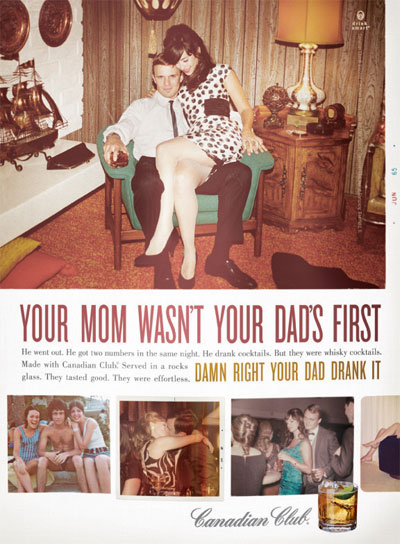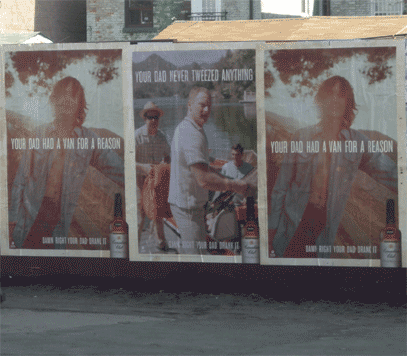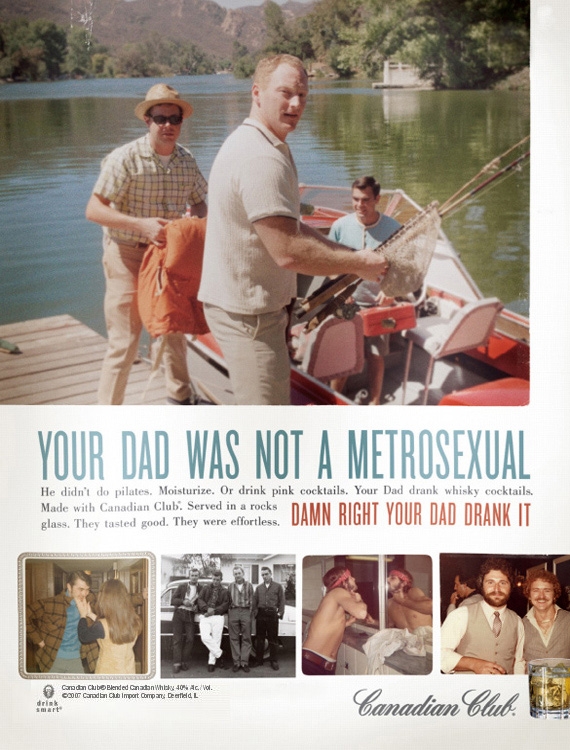[youtube]http://www.youtube.com/watch?v=jkEw1rsBUak[/youtube]
Funky Frum: Aimed at conservative Jews
Marabo: For Muslim women
Modest by Design: Formal wear; tagline is “Clothing your father would approve of.”
Shade: Aimed at Mormons
These could be useful in all kinds of ways–for instance, is it necessarily oppressive to dress “modestly”? Is there a difference in the tone of these websites (i.e., providing choice vs. “clothing your father would approve of”)? Do we view the website aimed at Muslim women differently than the others?

Nair (a cream hair-removal product) is now targeting teen girls. The Nair Pretty website treats shaving for the first time much like the first period–talk to your mom or older sisters! We know it can be scary! And of course what makes it scary is all the cuts and nicks you can get from a razor. And guess what? There’s an easy solution!
I especially like that Nair Pretty is supposedly formulated especially “for the skin of teenage girls.”

Almond = Asia
Apple = Europe/Asia
Apricots = Asia
Arrowroot = South America
Artichoke = Europe
Asparagus = Asia
Avocado = South America
Bamboo = Asia
Banana = Southeast Asia
Barley = Middle East (?)
Basil = India
Beet = Europe/Mediterranean
Bay = Mediterranean
Bitter melon = Africa/Asia/Australia
Black-eyed pea = North Africa/South Asia (?)
Black pepper = Tropical India
Blackberry = North America
Blueberry = North America/Europe
Brazil nut = South America
Breadfruit = Asia
Broccoli = Europe
Brussels sprouts = Europe
Buckwheat = Western China
Cabbage = Europe
Cacoa/cocoa = Mexico
Cannabis = Central Asia
Canna = South America
Capers = Mediterranean
Carambola (star fruit) = Asia
Carrot = Europe
Cashew = South America
Cauliflower = Europe
Celery = Mediterranean (?)
Cherry = Eurasia
Chestnut = North America
Chickpea/garbanzo bean = Southeast Turkey/Middle East
Chicory = Asia
Chili pepper = South American tropics
Chive = North America/Asia
Cilantro/coriander = Europe/Asia
Cinnamon = South Asian tropics
Clove = Indonesia
Coconut = Asia
Coffee = Ethiopia
Cola nut = West Africa
Collard = Europe
Corn = Mexico
Cranberry = Asia
Cucumber = Africa/Asia
Currant = Europe/Asia
Custard apple = South America
Date = Africa/Asia
Date palm = Asia
Eggplant = Africa/Asia
Endive = Asia
Fig = Europe
Garlic = Asia
Ginger = Southern China
Gooseberry = Europe
Grapefruit = Asia or West Indies
Grapes = Europe/North America
Sweet pea = Southwest Asia (?)
Guava = South America
Hazelnut = Europe
Hops = Near East
Jackfruit = Asia
Kale = Europe
Kiwi = Asia
Kohlrabi = Europe
Leek = Mediterranean and Middle East
Lemon = Asia
Lettuce = Western Asia
Lime = Asia
Loganberry = North America
Loquat = Asia
Macadamia nut = Africa/Australia
Mango = Asia
Manioc = South America
Maple sugar = North America
Marjoram = North Africa/Asia
Melon = Africa/Asia
Millet = East/Central Africa
Mint = Europe
Mustard = Mediterranean/Southwest Asia
Nutmeg = Malaysia
Oats = Near East
Oil Palm = West Africa
Okra = Asia
Olive = Europe/Middle East
Onion = Asia
Orange = Southeast Asia
Oregano = Eurasia
Papaya = South America
Paprika = South American tropics
Parsley = Eurasia
Parsnip = Eurasia
Passion fruit = South American tropics
Peach = Asia
Peanut = Brazil
Pear = Western Europe
Pecan = North America
Pineapple = South America
Pistachio = Mediterranean
Pomegranate = Asia
Potato = South America
Pummelo = Asia
Quinoa = South America
Radish = Europe/Asia
Raspberry = North America
Rhubarb = Asia
Rice = India/Southeast Asia
Rosemary = Mediterranean
Sapadilla = South America
Sesame = Africa, Asia
Sorghum = Africa
Soybean = Northeast China
Spinach = Asia
Squash = North America/South America
Strawberry = North America
Sunflower = North America/South America
Sweet pepper = South America
Sweet potato = South America
Swiss chard = Europe/Asia
Tamarind = India/Tropical rainforest
Tea = India/China
Tef = Ethiopia
Thyme = Mediterranean
Tomato = South America
Turnip = Asia
Vanilla = Mexico
Walnut = North America/Asia
Watermelon = Africa/Asia
Wheat = Near East
Wild rice = North America
Yam = Asia
Yantia = South America
Zucchini = North America/South America
I use these in class to illustrate how “tradition” is constructed–for instance, tomatoes are now seen as the essence of traditional Italian cooking, and yet they are native to South America and only made it to Italy a few hundred years ago, and coffee is native to Ethiopia but the country most associated with it today is Colombia.
It’s also useful for talking about globalization and showing that it’s been going on longer than the last 100 years or so–movement of crops within and between hemispheres has been going on for thousands of years.
These are from L.H Bailey, Ethel Zoe Bailey, and the Staff of Liberty Hyde Bailey Hortotorium. 1997. Hortus Third: A Concise Dictionary of Plants Cultivated in the United States and Canada. New York: Barnes & Noble.

Borrowed from Grad Student Madness.
Text:
YOUR DAD WAS NOT A METROSEXUAL. H didn’t do pilates. Moisturize. Or drink pink cocktails. Your Dad drank whisky cocktails. Made with Canadian Club. Served in a rocks glass. They tasted good. They were effortless. DAMN RIGHT YOUR DAD DRANK IT.
Toph sent in another Canadian Club ad that makes it clear that it’s awesome if your dad was a player:

Text:
Your Mom wasn’t your Dad’s first. He went out. He got two numbers in the same night. He drank cocktails. but they were whisky cocktails. Made with Canadian Club. Served in a rocks glass. They tasted good. They were effortless.
I’m going to use this to talk about the sexual double standard–try to imagine the same ad, but saying “Your dad wasn’t your mom’s first” with pictures of her with several different men. I don’t think the impression would be the same.
Thanks, Toph!
NEW: Outdoor version of “Your Dad had a van for a reason.”


This might be a useful image for talking about the commodification of protest and “alternative” culture. It was being sold at the H&M store in Pasadena. It’s the latest in a progression of the co-opting of the punk aesthetic–first stores like Hot Topic started selling clothing with rips and safety pins and such in them, so you could go pay a lot of money for pre-packaged punk or goth looks. Now it’s gone a step further where they no longer even bother to put a real safety pin in–now you just get pictures of safety pins, meant to evoke that sense of non-conformity in the safest, most easily-marketed way possible, along with your Sum 41 (or whatever their name is) CD.

